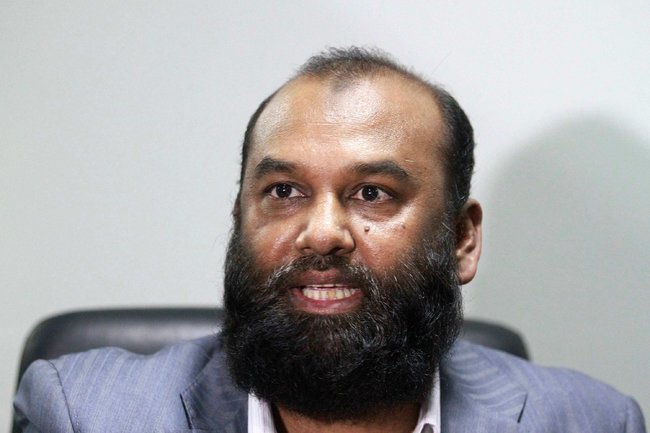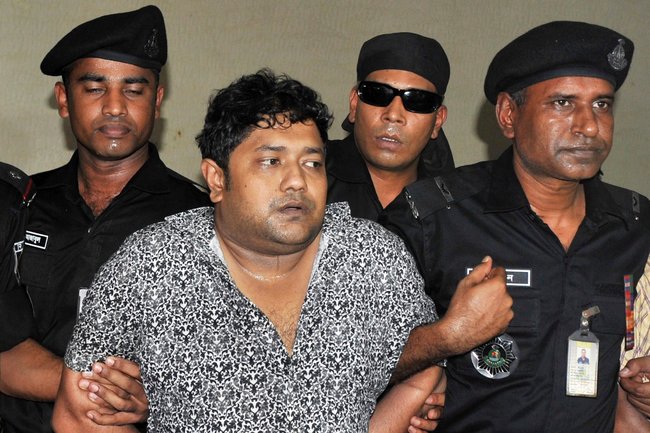by Jim Yardley. The New York Times
DHAKA, Bangladesh ? Inside Courtroom 21, the two judges peered down from high wooden chairs as lawyers in formal black robes presented their motions. Activists and victims watched from the back. And a few steps away, a portly man with a thick black beard remained silent. He was the suspect. He did not seem especially nervous.

Perhaps that is because the man, Delowar Hossain, has not yet been charged with anything ? and may never be. He has been a vilified figure since his garment factory, Tazreen Fashions,?caught fire last November, killing 112 workers who were making clothes for retailers like Walmart and Sears. A high-level government investigation found fire safety violations and accused Mr. Hossain of ?unpardonable negligence.?
?How do you sleep at night?? a woman screamed as Mr. Hossain left the courtroom after the hearing on June 19. The more pertinent question might be this: In Bangladesh, where the garment industry powers the economy and wields enormous political clout, is it possible to hold factory owners like Mr. Hossain accountable?
Now is undeniably the test. The Tazreen Fashions fire was followed by?the April collapse of the Rana Plaza?factory building, in which 1,129 people were killed in the deadliest disaster in the history of the garment industry. A global supply chain that delivers low-cost clothes from Bangladeshi factories to stores in the West was suddenly redefined by images of mutilated bodies pulled from the rubble. The Obama administration responded last week by rescinding a special trade privilege for Bangladesh over concerns about safety problems and labor rights violations in its garment industry.
But Bangladeshi factories have always suffered fires and accidents, usually without attracting international attention. One study estimated that more than 1,000 workers died in hundreds of factory fires or accidents from 1990 to 2012. Not once was a factory owner charged with any crime, activists say.
?We want to set a legal precedent that factory owners can?t get away with this,? said Saydia Gulrukh, an anthropologist and social activist.
One way to interpret the hearing for Mr. Hossain was as an act of exasperation. It was not a criminal trial. Instead, Ms. Gulrukh and a handful of other activists and lawyers had become so frustrated that they petitioned the Bangladesh High Court to overstep the stalled police investigation and decide whether criminal charges should be filed. The proceeding is already bogged down and could take months, or longer.
?They are just delaying the process,? said Jyotirmoy Barua, the lawyer handling the petition, speaking of Mr. Hossain?s defense team. ?They think we will lose the spirit of fighting. But they have miscalculated.?
Bangladesh?s legal system has rarely favored anyone confronting the power structure. Much of the legal code has remained intact since the British imperial era, when laws were devised to control the population and protect the colonialist power structure. Legal reformers continue to push to modernize the criminal code, but the pace of change has been slow. Moreover, the police and other security forces are deeply politicized, with a bloody legacy of carrying out extrajudicial killings.
Many garment factory owners are now entrenched in the nation?s power elite, some as members of Parliament. Garments represent 80 percent of the country?s manufacturing exports,?giving the industry vast economic power, while factory owners also finance campaigns during national elections, giving them broad political influence.
The April 24 collapse of Rana Plaza, located in Savar, an industrial suburb of Dhaka, seemed to shock a system often inured to factory accidents. On the morning of the collapse, factory workers had been ordered into the building, even though cracks had appeared a day earlier and an engineer had warned that the structure was unsafe. The building?s owner,?Sohel Rana, disappeared amid speculation that he would avoid prosecution because he was affiliated with the governing political coalition, the Awami League.

Many garment factory owners, like Sohel Rana, are entrenched in Bangladesh’s power elite.
But incensed High Court judges ordered the police to arrest Mr. Rana, as well as the owners of the garment factories inside the building. Mr. Rana was hauled into the courthouse, along with the factory bosses, surprising some legal activists who could not remember a single case in which judges had taken such action against members of the garment industry.
?That was very unusual,? said Sara Hossain, a Supreme Court lawyer and legal activist, who is not related to Delowar Hossain. ?I think it was only possible because of the level of national and international outrage.?
Ms. Hossain has fought the garment industry for years over the 2005 collapse of the Spectrum sweater factory in Savar, in which at least 64 workers died. Soon after the collapse, she and other lawyers petitioned the court and pressed for affidavits from different agencies to determine who was to blame, in hopes of stirring a prosecution.
But years passed without any action until, in 2009, government lawyers announced that the court file had been lost. Hearings kept getting postponed, she said, as court officials kept saying the file was lost. Then, after the Rana Plaza collapse, Ms. Hossain won another hearing. The judges suddenly seemed animated as she asked for a formal investigation into the missing file.
Inside the file were dusty affidavits, including one from the agency that regulated construction projects in Savar. It warned that Savar and other areas had many hazardous buildings and recommended forming a task force to investigate. It was dated 2006, the year construction began on Rana Plaza. ?If that report had been acted upon and seen the light of day,? she said, ?surely you could have avoided Rana Plaza.?
Now, the lawyers trying to bring charges against Mr. Hossain, the owner of Tazreen Fashions, are facing their own obstacles. First, they sought a copy of the government investigation that had blamed Mr. Hossain for negligence. Though reporters were?briefed on the main findings last December, the investigation report was never publicly released. But at one hearing, government lawyers said the Home Ministry had not yet provided them with a copy.
On June 19, the two-judge panel seemed annoyed when the government lawyers again failed to properly file the report with the court. (They did so later in the day.) When one of the judges, Quazi Reza-ul Hoque, expressed interest in broadening the case, the main defense lawyer stepped to the lectern, agreeing that the failings of the government should also be explored, but also adding a reminder about the garment industry.
?This is a very important economic factor in our country,? said the lawyer, Fida M. Kamal. When he raised the same point a few moments later, one of the judges agreed.
?We have to keep that always in mind,? Judge Hoque said.
In the days after the Tazreen Fashions fire, evidence of negligence mounted: the factory did not have a current fire safety license; the blaze had started in an illegal ground floor storage area filled with flammable fabric; some managers had ordered workers to ignore a fire alarm while others had locked metal gates, blocking some of the staircases.
The police arrested a few factory managers but took no action against Mr. Hossain, even as families of victims called for murder charges. Investigators initially questioned whether the fire was caused by sabotage, though the country?s home minister later discounted that claim, but he also said that arresting Mr. Hossain was not necessary.
In court this month, Mr. Hossain and his lawyer refused to comment. A few men stood silently near the owner in the rear of the small room. One of them, Motiqul Islam Matin, had lost his sister in the Tazreen Fashions fire. She had called him from the fourth floor, shrieking, saying she was trapped because her managers had locked the metal gates.
Last month, Mr. Matin filed a court petition, seeking murder charges against Mr. Hossain. Soon after, he said he began getting telephone calls. ?They wanted to know where I lived,? he said. ?I was scared. I did not tell them. I went into hiding.?
Another man in the courtroom, Mohammad Abdul Jabbar, carried a photograph of his wife and infant son. His wife had died on the fourth floor. He had tried in vain to seek compensation or government help and now said he only wanted to see Mr. Hossain convicted.
?I want justice,? he said after the hearing. ?The whole system favors men like Delowar. He is a rich man. He is getting protection from the people who are supposed to listen to our voices.?
He added, ?Wherever I go, officials tell me to go somewhere else.?





Leave a Reply
You must be logged in to post a comment.